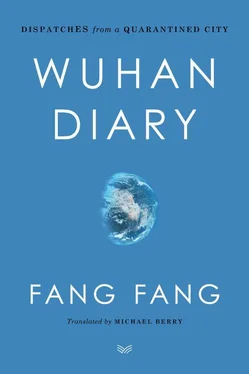As I was translating Wuhan Diary , “weaponizing” the book, or using it as a tool to criticize China, was surely the last thing on my mind. In contemporary Chinese literature, Fang Fang has been the single most powerful voice to emerge from Wuhan in decades. When the coronavirus outbreak occurred, many people looked to her for solace, information, and a path forward. She became, more than anyone else, a voice that people could look to for an honest appraisal of what was happening every day in Wuhan during the age of COVID-19. Even as the world slumbered, Fang Fang’s voice was crying out daily. Her cries needed to be heard around the world, both as a personal testament to the horrors the people of Wuhan were enduring and as a warning of what might come to the world if precautions were not taken. So, instead of weaponizing Wuhan Diary , I instead felt the pressing need for the United States, and the world for that matter, to learn from Fang Fang. Part of that lesson comes from Fang Fang’s compassion and bravery, but another side comes from her audacity—the audacity to bear witness, the audacity to refuse to be silenced even when thousands of vicious attacks are raining down on her head, and the audacity to speak truth to power.
In a country with 1.4 billion people, crowded with hundreds of satellite television stations, newspapers, websites, and state media, somehow this lone figure cut through all the noise and emerged as the voice of Wuhan. Her words became the city’s heartbeat and its conscience. Her diary became a lightning rod for activism and criticism, compassion and malice, love and hate— all playing out every day in the seemingly endless comments thread that trailed behind her every post.
I first encountered Fang Fang’s fiction back in the mid-1990s when I read several of her stories and novellas, including Black Hole. I followed her career for more than two decades before a mutual friend put us in touch regarding the translation of her controversial novel A Soft Burial . I fell in love with the novel and had actually been translating that work for her when news of the novel coronavirus began gaining attention all over the world. Knowing that Fang Fang is a longtime resident of Wuhan, I texted her several times to check in on her and make sure she and her family were okay, but she never mentioned anything about her diary. It wasn’t until mid-February—roughly two weeks into the diary—that a close friend recommended that I take a look. By then, the diary had already “gone viral,” so to speak, in unfortunate synchronicity with the virus, and was all over the Chinese internet. I read a few entries and was immediately drawn in.
I had been closely following news of the coronavirus outbreak since January; I even co-organized one of the first public forums on COVID-19 in the United States with members of the Fielding School of Public Health at the University of California, Los Angeles. But, frankly speaking, as someone with no medical training, I felt quite helpless in the face of the coronavirus. What can I do, what can any individual do, in the face of a global threat like COVID-19? But as soon as I read a few entries from Fang Fang’s Wuhan Diary, I immediately knew what I could do. This was something I could contribute.
I immediately wrote to Fang Fang, suggesting that I temporarily table my translation work on A Soft Burial and, instead, translate Wuhan Diary first. Fang Fang initially hesitated; after all, her diary wasn’t even finished, and the coronavirus events were still playing out in unpredictable ways. Eventually, however, we both agreed that this was a story that needed to be told and that the world needed to hear Fang Fang’s testimony. The writing was on the wall, so to speak; the virus was spreading; and I felt an urgent need to get Fang Fang’s words out as quickly as possible. I put other projects aside and started to furiously translate, often producing more than 5,000 words a day. At the time, I had no way of knowing that this would evolve into one of the more simultaneously rewarding and excruciating projects I had ever undertaken. It was also, in many ways, the strangest.
Let’s start with the strange. Over the course of my translation, it was as if I were living simultaneously in three different temporalities. When you delve deeply into a translation, part of your psyche becomes embroiled in the author’s world. You swim in her language, breathing it, internalizing it, before rendering it into English. This is especially the case for a time-sensitive project like this one, on which I was translating for more than 10 hours a day, 7 days a week, always a month behind Fang Fang, although racing desperately to catch up. Yet beyond the language was Fang Fang’s inner world; translation allows you to enter that world in a much deeper way than simple reading. But Fang Fang’s world was of the past—I started translating Wuhan Diary on February 25, exactly one month after she began writing. So, everything I was translating was already a month behind, yet as coronavirus cases began to rise in the city of Los Angeles where I live, Fang Fang’s words increasingly felt like they were dispatches from the future. She was showing us where we were going, anticipating how society was likely to respond, and warning us where the many pitfalls lie.
So for 46 days, from February 25 through April 10, 2020, I translated roughly 5,000 words a day (minus a week’s break to recover from illness), living amid an unfolding pandemic, translating a diary written one month in the past, which somehow, simultaneously, offered glimpses into our future. Along the way, I experienced many moments when these different temporalities seemed to clash, in eerie and jarring ways. Take, for instance, Fang Fang’s outrage about the 40,000-person Lunar New Year event held in Baibuting, which resulted in widespread infections throughout Wuhan. Fang Fang published that entry on January 28; the day I was translating it, which was over a month later, on March 7, one of the headlines in the United States was “Trump Says Campaign Rallies Won’t Stop Over Coronavirus Fears.” How I wish that the people attending those rallies could read Fang Fang’s diary. Even at the time of this writing on April 11, mass church gatherings are still being held in many American states. On January 27, Fang Fang wrote an entire entry about the scarcity of face masks (there was no debate about the need to wear them, as that was already an obvious fact); however, the United States didn’t officially recommend that face masks be worn in public until April 3. And then an eerie incident occurred that still haunts me: On March 4, I had a doctor’s appointment and happened to just mention Wuhan Diary to my physician. At the time, I had recently translated the February 15 diary entry about Liu Fan; I told my doctor about how the coronavirus had wiped out this entire family of four in a matter of days. My doctor looked at me with skepticism and asked, “Isn’t it just like the flu? I’ve never heard of anything like that.” Almost exactly two weeks later, news of the coronavirus ravaging the Fusco family of Freehold, New Jersey, made headlines—four family members were lost in less than a week. I had grown up in Freehold and even went to high school with Peter Fusco; he lost two brothers, a sister, and his mother to the novel coronavirus, while three additional members of his family were also infected. Shocked, and still feeling helpless, I quickened the pace of my work.
Yet the strangest aspect of this project was the way my life gradually began to mimic Fang Fang’s. When I began work on Wuhan Diary , the outbreak in Wuhan felt like a world away for most people. As I translated those first entries, life initially continued as usual in Los Angeles. As a professor of Chinese studies, I frequently discussed with my students what was happening in Wuhan. Eventually, some international students started to wear face masks on campus, but most people in Los Angeles continued on with their normal lives and their usual routines: work, school, concerts, sporting events, parties. Meanwhile, I began to get anxious. Living in Fang Fang’s world had made me hypersensitive to what was surely coming, so I started considering canceling campus events that I was scheduled to host and I even discussed with my wife whether we should pull our kids out of school.
Читать дальше



![О Генри - Закупщик из Кактус-Сити [The Buyer from Cactus City]](/books/405348/o-genri-zakupchik-iz-kaktus-thumb.webp)








